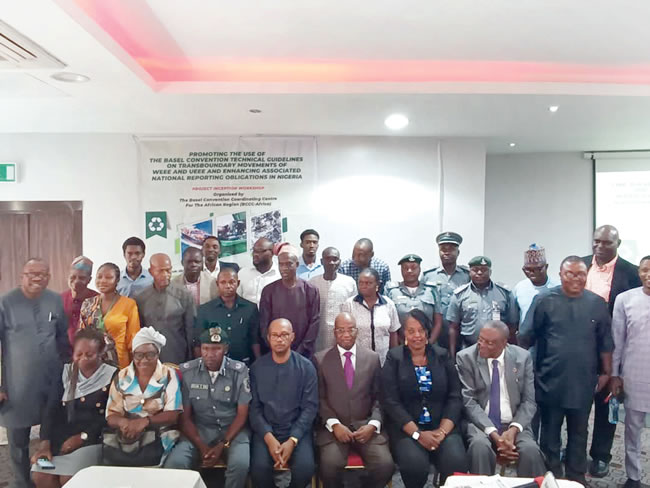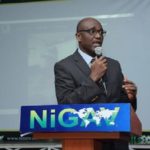Nigeria is a country that imports, on a large scale, items as simple as toothpicks to used cars and petroleum products. One of Nigeria’s massive imports is electronics ranging from consumer products like TVs, mobile phones and laptops to office equipment like photocopiers. The fall in the naira makes the importation of used electronics to be in high demand as they become far cheaper than the new ones. The Basel Convention Coordinating Centre for the African Region (BCCC) has identified that there is difficulty with discerning the difference between e-waste and non-e-waste in the control of imports and exports of used equipment into the country.
The centre therefore initiated a Basel Convention partnership programme known as the Partnership for Action on Challenges relating to E-waste (PACE-II) to address this challenge.
Currently, there is hardly any discrimination between what is termed used electrical electronic equipment (UEEE) and waste electrical electronic equipment (WEEE).
Distinguishing between the two is very important to avoid a build-up of electronic waste (e-waste) in the country.
E-waste is hazardous waste. E-waste can be harmful, is not biodegradable, and builds up in the land, air, water, and other living things in the environment.
A documented challenge
From 2015 to 2017, the Basel Convention Coordinating Centre for the African Region (BCCC), domiciled in an office in the University of Ibadan, conducted a study that revealed that about 60,000 tonnes of used electronics mixed with waste electronics were annually shipped into Lagos, Nigeria.
At least 15,000 tonnes of these were outright waste. It was noted that many relevant enforcement officials and stakeholders, namely customs, environmental regulators, importers, shipping agents, and Basel focal points, lacked the awareness and capacities for effective identification, distinction, and control of the illegal shipments.
This shortcoming also impacted the ability to meet national reporting obligations on illegal transboundary movement of e-waste.
Note that Nigeria, as a signatory to the Basel Convention, has the responsibility to report on the transboundary movement of e-waste, a class of hazardous waste.
The trade in e-waste is still expanding despite Nigeria’s regulatory agency’s limited success in blocking certain shipments.
The United Nations University in its 2020 global E-waste Monitor publication, estimated that an average of 20 per cent of used electronics generated in developed countries is shipped to developing countries of Africa and Asia for reuse, repair and illegal dumping.
Finding a solution
In November 2015, at a workshop organised by BCCC Nigeria for African countries in Lagos, the first draft of the “Technical guidelines on TBM of WEEE and UEEE, in particular regarding the distinction between waste and non-waste under the Basel Convention” was presented to delegates.
This valuable document has since been amended, updated and finally given an interim approval status at the 2019 14th COP of the Basel Convention, with a directive for parties to test the application of the guidelines.
As a follow-up, BCCC decided to host a project to raise awareness among stakeholders regarding the existence of the guidelines, and train core enforcement and related personnel on their application, thereby improving the effectiveness of control of TBM.
“In addition, we propose to work with relevant officials to improve capacities for national reporting obligations on TBM,” said Professor Percy Onianwa, the Executive Director of Basel Convention Coordinating Centre for the African Region.
To this end, a project inception workshop tagged, “Promoting the use of the Basel Convention technical guidelines on transboundary movements of waste electronics and used electronics, and enhancing associated national reporting obligations in Nigeria,” took place from December 14 to 15 in Lagos.
Professor Onianwa said that the project ensuing from the workshop seeks to promote and enhance control of transboundary movement of used electronics and waste electronics, prevent illegal trade in e-waste, and thereby promote environmentally sound management of electrical and electronic equipment at their end-of-life in Nigeria.
In particular, the project is to: raise awareness of the guidance document among relevant stakeholders; improve capacities and effectiveness for use of the guidance document among key stakeholders; enhance the capacities of national officials to meet reporting obligations on transboundary movement of waste electronics.
Need for collaboration
Comptroller-General of Customs (CGC), Col. Hameed Ibrahim Ali (rtd) was represented at the inception workshop by Assistant Comptroller of Customs, BI Ibrahim.
The Customs are key stakeholders in the issue of transboundary movement of e-waste.
“The Nigeria Customs Service as gatekeepers of the nation and strategically positioned at entry points is mandated to prevent the cross-border movement of hazardous waste. Oftentimes, the most effective measures to protect our environment from such waste are implemented at borders through Customs controls. Consequently, an understanding of the Basel Convention guidelines by frontline officers is key for its proper implementation.
“This is not attainable without the support and collaboration of other agencies of government statutorily empowered to enforce environmental laws like the NESREA and other key stakeholders in the sector,” Col Ali said.
The enforcement agency for environmental regulations in Nigeria is the National Environmental Standards and Regulations Enforcement Agency (NESREA).
The Director-General/CEO, NESREA, Prof Aliyu Jauro, said the agency was taking a number of steps to stop Nigeria from becoming a dumping ground for e-waste.
The NESREA boss noted that “Nigeria has signaled her refusal to be a dumping ground for e-waste and NESREA in its bid to control the impacts in the country is implementing the Extended Producer’s Responsibility (EPR) in all its relevant regulations.
The mere presence of these two key government agencies at the workshop was seen as a huge step forward in the task of combating the indiscriminate importation of e-waste into the country.
Professor Babajide Alo, a retired professor of Chemistry at the University of Lagos and facilitator at the event, said: “We have seen that one of the challenges that leaves gaps in environmental enforcement has been the fact that agencies were not cooperating. The agencies seemed to be working in silos. Since then, we have been pushing for better cooperation of the agencies in charge.
“In every country, there are multiple agencies looking after different aspects of sustainable development and environmental management. Nigeria is not different. However, in those other climes, the agencies work together.
“We are now beginning to see improvement in partnership and cooperation among these government agencies, which is to be commended. But more needs to be done among them so that the public doesn’t feel frustrated by multiple fines and charges from different agencies. The regulated public has an elastic limit they can take from different agencies coming to them for different things.”
He added that the collaboration among federal agencies needs to extend to state regulatory agencies.
Used electronics vs electronic waste: The difference
Professor Innocent Nnorom of the BCCC Africa hosted a technical session on “The technical guidelines on transboundary movement of hazardous and Other Waste / The Technical Guidelines on the Distinction Between Waste and Non-Waste electronic equipment.”
He explained to his audience how the technical guidelines differentiates between used electronics and electronic waste.
He explained: “Used electrical/electronic equipment are equipment that have been used before but are intended for re-use. For equipment to be classified as ‘used’ they should be functional. The equipment should be complete, the cable should not be cut, it should be tested and confirmed functional, it should not be obsolete; it should be well packaged before shipment. These are all conditions that should be met by such equipment.
“However when you have equipment that are not functional or have not been tested and confirmed functional, that certain components or cables are missing, broken or obsolete, such are not intended for re-use and are classified as waste.
“So the technical guideline provides these criteria for parties to the Basel Convention to adopt and apply to enable them differentiate between shipment of equipment that are intended for reuse and others intended for recycling.”
Important information for waste importers/exporters
On day two of the workshop, Professor Livinus Nwankwo, the Basel Convention Desk Officer at the Federal Ministry of Environment, held another technical session on ‘The Reporting System of the Basel Convention.’
The session was targeted at those making use of the prior informed consent procedure for importing and exporting electronic waste.
“They need to know what the requirements are, what is allowed and what is banned in the country. They can go to the website (basel.int) to find this information, who the focal point is, and other necessary information,” Nwankwo said.
He added that the reporting system is evolving, therefore importers and exporters need to stay abreast of the changes in the waste stream they want to get involved in and not run foul of the law.
About the Basel Convention
The Basel Convention on the Control of Transboundary Movements of Hazardous Wastes and their Disposal, usually known as the Basel Convention, is the most comprehensive global treaty for the control and management of hazardous wastes.
It was adopted March 22 1989 and came into force May 5, 1992. As at December 14, 2022 it had 190 parties.
The Basel Convention’s main objective is to protect human health and the environment from the negative impacts of hazardous wastes and other wastes.
However, the Basel Convention has three key pillars. They are: control of transboundary movement of hazardous wastes; environmentally sound management of hazardous & other wastes; and minimisation of sources of generation of hazardous wastes.
YOU SHOULD NOT MISS THESE HEADLINES FROM NIGERIAN TRIBUNE
PICTORIAL EXPLAINER: How To Identify Fake New Naira Notes
The Central Bank of Nigeria (CBN) has released security features to help identify fake new naira notes. According to CBN’s template, the Security features to look out for are the following…
Ondo Councils’ Workers Shut Down Assembly Over LG Autonomy
LOCAL government workers under the aegis of Nigeria Union of Local Government Employees (NULGE), Ondo, on Tuesday, stormed the State House of Assembly, threatening a showdown with the lawmakers over the signing of local government autonomy…
FG To Discontinue Cash Withdrawal From Public Accounts
The Federal Government is putting the final touches to all necessary measures to stop cash withdrawal from federal, state, and local government accounts. The Director/Chief Executive Officer of the Nigerian Financial Intelligence Unit (NFIU), Modibbo Hamman Tukur, revealed…
Reps Probe Crude Oil Sales Over $2.4bn Revenue Loss
The House of Representatives on Tuesday unveiled plans to investigate the allegation bothering on the alleged loss of over $2.4 billion in revenue accruing from the illegal sale of 48 million barrels of crude oil export from 2014 till date…
Emefiele/DSS Tango: Falana Asks Judiciary To Treat Civil Liberty Cases Equally
LEADING rights lawyer, Mr. Femi Falana, on Tuesday addressed the controversial move by the nation’s secret police to arrest and detain the embattled Governor of the Central Bank of Nigeria (CBN), Godwin Emefiele…
EDITORIAL: CBN’s New Cash Withdrawal Limits
As a follow-up to its redesign of the N200, N500, and N1000 banknotes, the Central Bank of Nigeria (CBN) recently announced a new policy that mandates deposit money banks and other financial institutions to ensure that…






